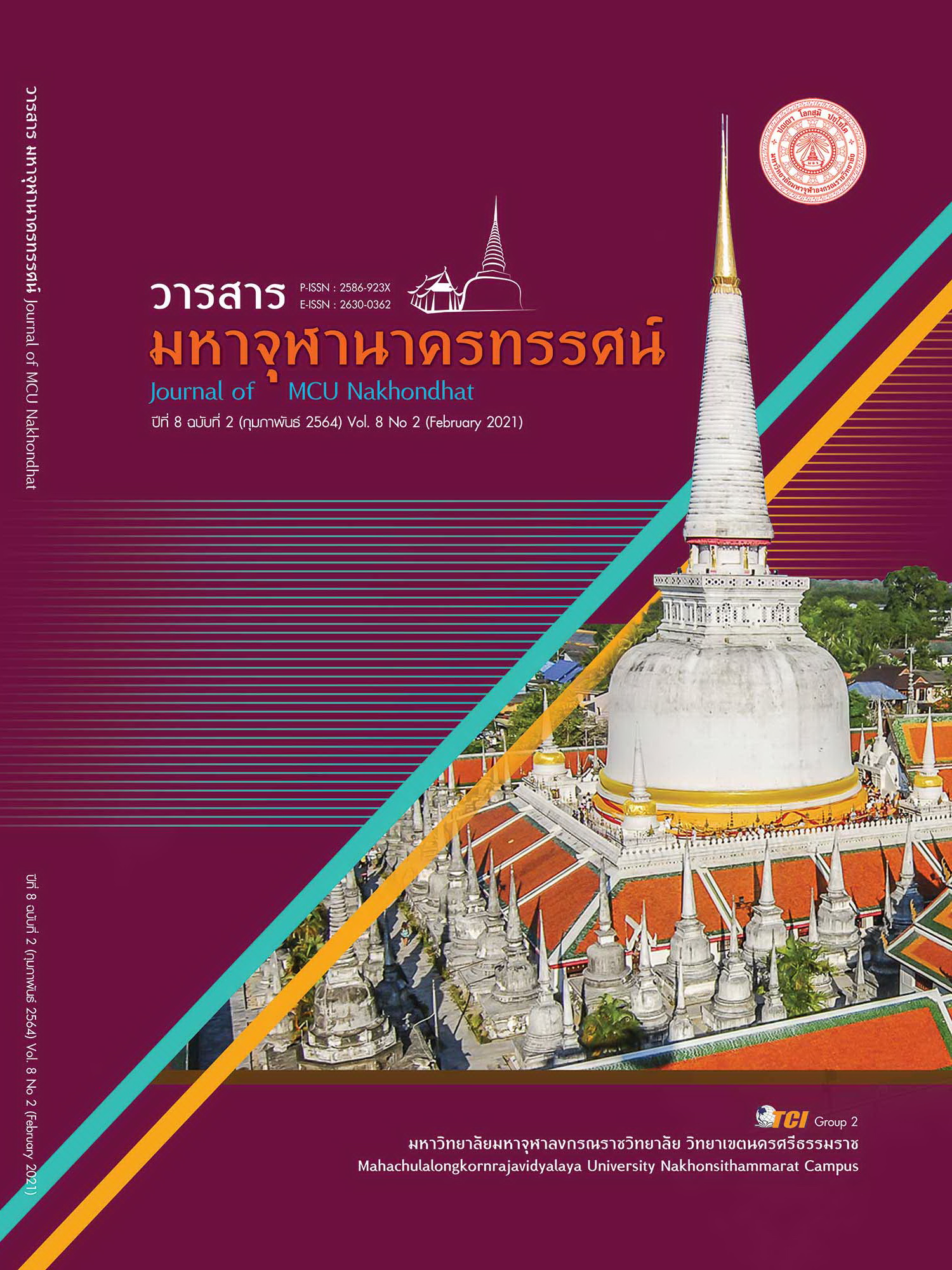THE GUIDELINE FOR LEARNING ORGANIZATION DEVELOPMENT OF SCHOOLS UNDER THE OFFICE OF PRIMARY EDUCATIONAL SERVICE NONGBUALUMPHU PROVINCE
Main Article Content
Abstract
The objectives of this research article were to 1) the present context and desirable context to be a learning organization, 2) to find the guidelines for learning organization development in school under The Office of Primary Educational Service Nongbualumphu province. The sample used in this research was of 183 school administrators. The research was divided into 2 phases. Phase 1: The present context and desirable context in school under The Office of Primary Educational Service Nongbualumphu province to be a learning organization. The research instrument was the 5 - level - rating scale. The data were analyzed by frequency, percentage, mean and standard deviation.Phase 2:to find the guidelines development in to be a learning organization by using semi - structured interviews. verify the guidelines for development academic leadership of school administrators. The research results were found that 1) The present context for school to be a learning organization were at a high level all and the desirable context for school to be a learning organization were at a highest level. 2) The guidelines development in school to be a learning organization comprise 5 sides 25 guidelines the following: the guideline for learning organization development in school ought to define performance standards, survey teacher’s requirement, and develop teacher by preparation ID plan. The teachers should adjust the working method and used human relations and find the guideline in performance together and encourage skill for teachers in team work and The teachers should lead knowledge and experience in working to develop and continue and verify of the guidelines development in school to be a learning organization by the experts revealed that all guidelines were feasible.
Article Details
References
. (2557). นโยบายสำนักงานคณะกรรมการการศึกษาขั้นพื้นฐาน ปีงบประมาณ 2558. กรุงเทพมหานคร: ชุมนุมสหกรณ์การเกษตรแห่งประเทศไทย.
จารุวรรณ พรมบุตรดี. (2557). ความสัมพันธ์ระหว่างภาวะผู้นำการเปลี่ยนแปลงของผู้บริหารสถานศึกษากับความเป็นองค์กรแห่งการเรียนรู้ของสถานศึกษาขั้นพื้นฐานในกลุ่มเกาะแก้ว สังกัดสำนักงานเขตพื้นที่การศึกษาประถมศึกษาระยอง เขต 1. ใน วิทยานิพนธ์การศึกษามหาบัณฑิต สาขาวิชาการบริหารการศึกษา. มหาวิทยาลัยบูรพา.
จุรีย์ สร้อยเพชร. (2558). รูปแบบองค์การแห่งการเรียนรู้ของสถานศึกษาพื้นฐานยอดนิยม. ใน ดุษฎีนิพนธ์การศึกษาดุษฎีบัณฑิต สาขาวิชาการบริหารการศึกษา. มหาวิทยาลัยบูรพา.
ธีระ รุญเจริญ. (2550). ความเป็นมืออาชีพในการจัดและบริหารการศึกษายุคปฏิรูปการศึกษา. กรุงเทพมหานคร: แอล ที เพรส จำกัด.
บุญชม ศรีสะอาด. (2560). การวิจัยเบื้องต้น. (พิมพ์ครั้งที่ 8). กรุงเทพมหานคร: สุวีริยาสาส์น จำกัด.
พอหทัย ภิรมย์ศรี. (2554). การศึกษาแนวทางการส่งเสริมความเป็นองค์การแห่งการเรียนรู้ของโรงเรียนนาหลวง สำนักงานเขตทุ่งครุ สังกัดกรุงเทพมหานคร. ใน วิทยานิพนธ์การศึกษามหาบัณฑิต สาขาวิชาการบริหารการศึกษา. มหาวิทยาลัยศรีนครินทรวิโรฒ.
ศักดิ์สิน โรจน์สราญรมย์. (2554). การบริหารเพื่อการเรียนรู้. กรุงเทพมหานคร: พัฒนาคุณภาพวิชาการ.
ศิวพร แสนรัตน์. (2556). ลักษณะความเป็นองค์การแห่งการเรียนรู้ของโรงเรียนบ้านเนินพลับหวาน สังกัด สำนักงานเขตพื้นที่การศึกษาประถมศึกษาชลบุรีเขต 3. ใน วิทยานิพนธ์การศึกษามหาบัณฑิต สาขาวิชาการบริหารการศึกษา. มหาวิทยาลัยบูรพา.
สํานักงานเขตพื้นที่การศึกษาประถมศึกษาหนองบัวลําภู เขต 1. (2562). แผนปฏิบัติการประจําปีงบประมาณ 2562. หนองบัวลําภู 1. จังหวัดหนองบัวลําภู: สำนักงานเขตพื้นที่การศึกษาประถมศึกษาหนองบัวลำภู เขต .
Pavel, B. (2020). The learning company: the learning organization the British way its origins, present, and future directions. An interview with John Burgoyne. The Learning Organization, 27(3), 249-257.
Rupcic, N. (2019). Learning organization – Learning Organization – Organization Emerging from Presence. The Learning Organization, 27(1), 17-30.


